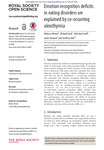Please use this identifier to cite or link to this item:
http://lib.hpu.edu.vn/handle/123456789/21719Full metadata record
| DC Field | Value | Language |
|---|---|---|
| dc.contributor.author | Brewer, Rebecca | en_US |
| dc.contributor.author | Cook, Richard | en_US |
| dc.contributor.author | Cardi, Valentina | en_US |
| dc.date.accessioned | 2016-06-25T01:57:14Z | |
| dc.date.available | 2016-06-25T01:57:14Z | |
| dc.date.issued | 2015 | en_US |
| dc.identifier.other | HPU4160219 | en_US |
| dc.identifier.uri | https://lib.hpu.edu.vn/handle/123456789/21719 | - |
| dc.description.abstract | Previous research has yielded inconsistent findings regarding the ability of individuals with eating disorders (EDs) to recognize facial emotion, making the clinical features of this population hard to determine. This study tested the hypothesis that where observed, emotion recognition deficits exhibited by patients with EDs are due to alexithymia, a co-occurring condition also associated with emotion recognition difficulties. Ability to recognize facial emotion was investigated in a sample of individuals with EDs and varying degrees of co-occurring alexithymia, and an alexithymia-matched control group. Alexithymia, but not ED symptomology, was predictive of individuals’ emotion recognition ability, inferred from tolerance to high-frequency visual noise. This relationship was specific to emotion recognition, as neither alexithymia nor ED symptomology was associated with ability to recognize facial identity. These findings suggest that emotion recognition difficulties exhibited by patients with ED are attribu able to alexithymia, and may not be a feature of EDsper se. | en_US |
| dc.format.extent | 12 p. | en_US |
| dc.format.mimetype | application/pdf | - |
| dc.language.iso | en | en_US |
| dc.publisher | The Royal Society | en_US |
| dc.subject | Psychology | en_US |
| dc.subject | Cognitive neuroscience | en_US |
| dc.subject | Behaviour | en_US |
| dc.subject | Cognition | en_US |
| dc.subject | Alexithymia | en_US |
| dc.subject | Facial expressions | en_US |
| dc.subject | Emotions | en_US |
| dc.subject | Face perception | en_US |
| dc.subject | Eating disorders | en_US |
| dc.title | Emotion recognition deficits in eating disorders are explained by co-occurring alexithymia | en_US |
| dc.type | Book | en_US |
| dc.size | 690KB | en_US |
| dc.department | Education | en_US |
| Appears in Collections: | Education | |
Files in This Item:
| File | Description | Size | Format | |
|---|---|---|---|---|
| 0102_Emotion_recognition_deficitsineatingdisorders.pdf Restricted Access | 690.77 kB | Adobe PDF |  View/Open Request a copy |
Items in DSpace are protected by copyright, with all rights reserved, unless otherwise indicated.
